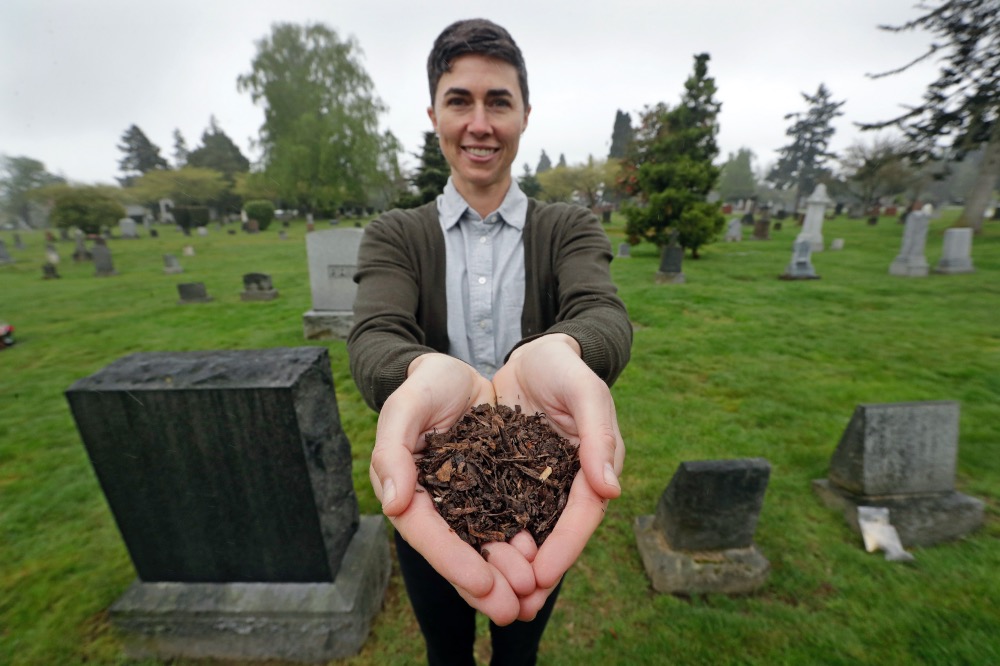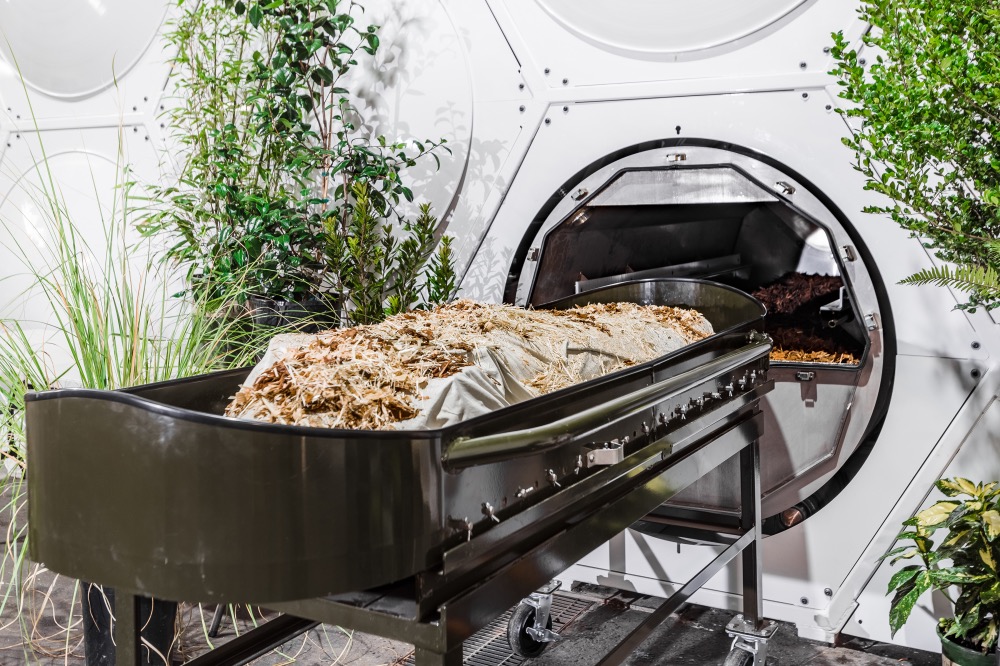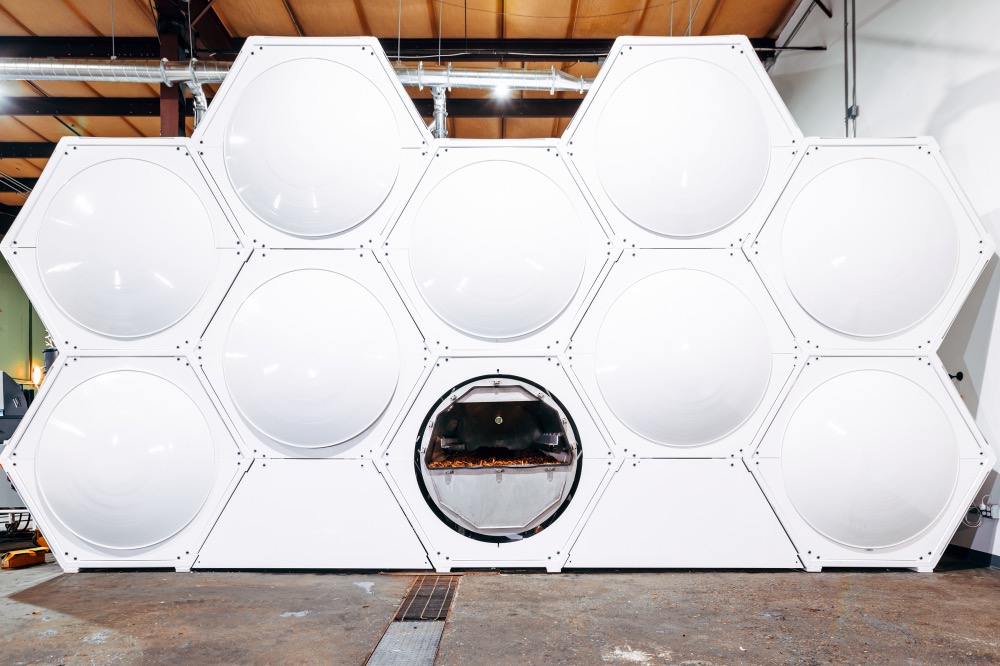
ALEJANDRA MOLINA, of Religion News Service, reports on the opening of the first human-composting funeral home in Washington and the push for the practice, controversial for some, to be legalised in California…
As the nation’s first human-composting funeral home is now operational in the state of Washington, death care specialists say this new and environmentally friendly procedure is crucial as mortuaries fill up and people seek more sustainable practices.
And in California, where the massive number of COVID-19 deaths has inundated funeral homes and even led to Los Angeles County’s suspension of air quality regulations on cremation, one legislator hopes the Golden State becomes the next place to legalise the process of converting bodies into soil.

In this 19th April, 2019, file photo, Katrina Spade, the founder and CEO of Recompose, a company that hopes to use composting as an alternative to burying or cremating human remains, poses for a photo in a cemetery in Seattle, as she displays a sample of compost material left from the decomposition of a cow using a combination of wood chips, alfalfa and straw. PICTURE: AP Photo/Elaine Thompson/File photo.
To California State Assembly member Cristina Garcia, a Democrat, LA’s pandemic situation “is another sad reminder that we must legalise a more environmentally friendly option as soon as possible,” she said in a statement.
On 9th February, Garcia introduced legislation that would give California residents the legal option to have their bodies turned into soil. It’s her second time doing so after her first human composting bill did not make it out of a Senate appropriations committee.
Human composting is seen as a more sustainable alternative to cremation, which requires fossil fuels and releases carbon dioxide that pollutes and contributes to climate change. The process for composting a body was first introduced by Katrina Spade, who founded Recompose, the Washington state-based company that opened for business in late December.
Human composting is seen as a more sustainable alternative to cremation, which requires fossil fuels and releases carbon dioxide that pollutes and contributes to climate change. The process for composting a body was first introduced by Katrina Spade, who founded Recompose, the Washington state-based company that opened for business in late December.
The state of Washington legalised the procedure in 2019.
Here’s how it works: A dead body is broken down through a process known as natural organic reduction by placing the corpse in a reusable vessel, covering it with wood chips and aerating it, which creates an environment for microbes and essential bacteria.
The body, over a span of 30 days, is fully transformed into soil, the company says. Recompose is equipped with 10 vessels.
Anna Swenson, a Recompose spokeswoman, told Religion News Service on 2nd February that 10 bodies had so far been placed in vessels to undergo the human composting process. Some had already been turned into soil, while other bodies were still in the vessels.
Since August, Recompose has offered prepayment options for people who would like to begin making those arrangements for themselves or loved ones. The cost: $US5,500, under the Precompose plan. A payment plan of $US25 to $US500 a month is available.
As of early February, Swenson said about 550 people from across the world had signed up for Precompose.

A example vessel that is used in the natural organic reduction process created by Recompose. PICTURE: Photo by Sabel Roizen
Costs go toward the actual soil transformation process as well as death certificate filing. It also includes the opportunity for a virtual ceremony facilitated by staff during what Recompose calls the “laying-in,” the practice of placing the body into the vessel. This marks the moment the body’s transformation into soil begins, Recompose says.
The laying-in looks different for everyone. It can include faith leaders or special speakers, slideshows of pictures, music or a ceremony modeled after the carbon cycle.
The carbon cycle, according to the National Oceanic and Atmospheric Administration, “is nature’s way of reusing carbon atoms, which travel from the atmosphere into organisms in the Earth and then back into the atmosphere over and over again.”
This ritual “helps remind us of our place in that cycle and the transition of our person from their human form to a part of the natural collective,” according to Recompose. The ceremony includes candle lighting and guided breathing as Recompose staff highlights how plant material will “power” the body’s transformation and gives thanks to the person for their “gift to the planet.”
As part of the plan, resultant soil will be donated to the Bells Mountain forest in the state of Washington. Family and friends, however, can also choose to take home the soil. Transportation of the body from anywhere in King, Pierce and Snohomish counties of Washington state to the Recompose facility is covered. People outside of Washington state can sign up but must separately arrange for transport of the body.
This would apply to people like Cori Ruetten, 33, who lives in a state where the process is not yet legal.
Ruetten, of Maryland, was ready to sign up for Precompose when she first heard of the payment plan, but she opted to wait to see if the process is legalised in her home state.
“I was very, very excited to learn about it [Recompose],” Ruetten said. “I was disappointed to find out…this isn’t really legal everywhere.”
To Ruetten, the Recompose process “returns us to the earth, maybe the way that we were meant to.” She finds human composting affordable and environmentally friendly.
Ruetten said it makes sense to plan one’s own death care through programs like Precompose. When her father unexpectedly died in 2016, she found herself having to organise a funeral on a budget with no plan in place. She chose cremation out of financial need.
“As his daughter taking that over, I was simultaneously struck by how expensive and how plastic everything that’s available is nowadays, and I was also grieving,” Ruetten said.
“Taking all that guesswork out of it, I think so much of the grieving process is second-guessing yourself and spending all this ridiculous money,” she added.

The Recompose vessel array can accommodate 10 bodies. PICTURE: Sabel Roizen
Meanwhile in California, proponents feel the human composting bill is in better shape than last year.
Annabel Snider, a senior assistant handling policy for Garcia’s office, said this time around they’ve already engaged with the state’s cemetery and funeral bureau, allowing the agency to make any suggestions and amendments early on in the process.
Snider is also aware of certain groups’ opposition of the bill, such as the California Catholic Conference that came out against the proposed measure last year.
“We believe that the ‘transformation’ of the remains would create an emotional distance rather than a reverence for them,” Steve Pehanich, a spokesperson for the California Catholic Conference, told RNS in 2020.
The Vatican, in 2016, released guidelines for the treatment of remains as the use of cremation grew in popularity. If cremation was chosen, the Vatican urged that remains be kept “in a sacred place”, such as a cemetery or in a church area.
“Even with cremated remains, they directed that they remain in a communal place befitting of the dignity inherent in the human body and its connection to the immortal soul,” Pehanich said.
Snider on 9th February said Garcia’s office would be reaching out to the California Catholic Conference to discuss the bill. To Snider, it’s encouraging the Catholic Church wound up allowing cremation after long forbidding it.
Human composting, she said, is “something that a lot of people in California are eager to have as an option.”





